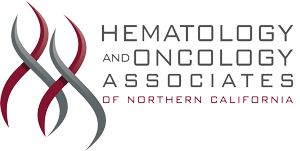COMPASSION, CONVICTION, AND COURAGE

Lung Cancer
Services are offered in Folsom, Elk Grove, & Roseville CA
Lung cancer far outranks all other cancers as the leading cause of death, yet if you catch it at an early stage, it’s highly curable. Skilled medical oncologists Mansoor Javeed, MD, FACP, and Christian Kim, MD, at Hematology and Oncology Associates of Northern California in Folsom and Elk Grove, California, recommend that anyone with a history of smoking consider lung cancer screening around age 50. If you have lung cancer, they offer exceptional care, including chemotherapy and today’s most advanced targeted and immunotherapy options. To schedule an appointment, call the nearest office or request an appointment online today.
Frequently asked questions
What causes lung cancer?
Smoking is the top cause of lung cancer, but anyone can develop the disease by inhaling cancer-causing substances, including second-hand smoke, air pollution, asbestos, and diesel exhaust.
Lung cancer symptoms develop as the cancer spreads. You may experience:
- Chronic cough
- Cough that produces blood
- Shortness of breath
- Unexplained weight loss
- Wheezing
- Chest pain
- Hoarseness
- Fatigue
These generic symptoms can also signal other lung diseases and health conditions, so don’t wait to see your physician.
How is lung cancer treated?
Your treatment depends on the type of lung cancer and its stage (the size of the tumor and if it has spread). There are two primary types of lung cancer:
Non-small cell lung cancer (NSCLC)
NSCLC represents 80-85% of all lung cancers. If possible, your treatment begins with surgery to remove the tumor.
If you can’t have surgery, your oncologist recommends radiation therapy, either alone or with chemotherapy. Today’s advanced radiation techniques can precisely target the tumor, eliminating cancer cells with little damage to the surrounding healthy tissues.
If NSCLC spreads, you will need other medical oncology treatments.
Small-cell lung cancer
This type of lung cancer grows quickly and spreads rapidly. As a result, it has usually metastasized before it’s diagnosed. Surgery is the first treatment in the early stages.
If the cancer has spread extensively through the lungs or into your body, you need chemotherapy, either alone or with immunotherapy and/or radiation therapy.
How do medical oncologists treat lung cancer?
The medical oncologists at Hematology and Oncology Associates of Northern California have extensive experience treating lung cancer with:
Chemotherapy
Chemotherapy eliminates cancer cells in your lungs and throughout your body. Depending on the stage of your cancer, you may need chemo before or after surgery, together with radiation therapy or immunotherapy, or for metastatic lung cancer.
Targeted therapy
Your provider may recommend one of many different drugs that stop cancer growth by targeting specific aspects of NSCLC. For example, some drugs stop tumors from producing the new blood vessels needed to thrive; others target genes in the cancer cells, preventing normal growth by making them mutate.
Immunotherapy (biological therapy)
Immunotherapy involves medications that boost your immune system, improving its ability to fight lung cancer. Your provider may combine it with chemotherapy or use several immunotherapy drugs.
You can depend on comprehensive lung cancer care at Hematology and Oncology Associates of Northern California. Call the office or request an appointment online today.
Hematology and Oncology Associates of Northern California
Phone (appointments): 916-250-0377
Address: 1631 Creekside Drive, Suite 102, Folsom, CA 95630
© 2025 Hematology and Oncology Associates of Northern California. All Rights Reserved.
Designed by Intelligent Designz
